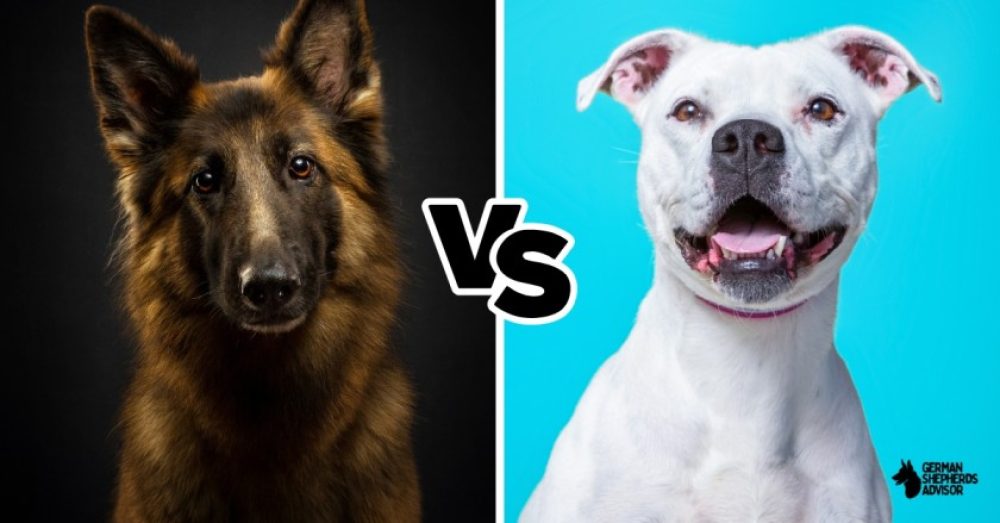German Shepherd vs. Pitbull remains one of the most interesting topics. When it comes to comparison of both breeds, it is actually very hard to decide which dog is better than the other. Mainly because both breeds are very popular in America. However, people like to know how both the dogs share common traits and what makes them different than the other.
In this article, we will be discussing everything about these two gorgeous breeds so that a person can get better information about both breeds. By comparing, we will find out the features that make them standout from the other dogs.
| Characteristics | German Shepherd | Pitbull |
|---|---|---|
| Height: | Males 60–65 cm (24–26 inches), Females 55–60 cm (22–24 inches) | Males 18–21 inches (46–53 cm), Females 17-20 inches (43-51cm) |
| Weight: | Males 65-90 pounds (30–40 kg), Females 45-75 pounds (22–32 kg) | Males 15-27 kg (33 to 60 pounds), Females 14-23 kg (31-51 pounds) |
| Lifespan: | Males 9-13 years, Female average of 11.1 years. | 8-16 years |
| Colours: | Black, white, black and tan, black and silver, red and black, sable, grey. | Black, brown, blue, white, brindle, fawn, tan, red, grey. |
| Temperament: | Intelligent, loyal, stubborn, brave, protective, curious, alert, and confident. | Obedient dogs, love to play challenging and physical games, |
| Breed Group: | Herding | Terrier |
| Other famous names: | German Shepherd names. | American Pit Bull Terrier, Pit Bull Terrier, pit, pittie. |
| Suitable for: | Gentle, sociable, playful dogs, females are good with children and have sweet-nature, for experienced dog owners. | Well-trained pit bulls are good with family and children, good for beginner and first time owner. |
| Cost: | Breeder cost: $2000 to $4500, Puppy cost: $450-$1900 | $200-$1000 per puppy. Cost may vary in different regions. |
History
In the late 19th century, like the name indicates, German Shepherds sprang into existence in Germany. They were bred by Max von Stephanitz, an ex-military officer, by mixing some of the many variants of breeding dogs that were found throughout Germany, and they were targeted to be working dogs.
They were bred for the sole purpose of guarding and herding the sheep, hence the name German Shepherd. The German Shepherds were exhibited for the first time in 1882 at a festival in Hanover of Lower Saxony.
Ever since they were initially bred, German Shepherds have evolved in ways that now days they seem unrecognizable. They had a craggy coat, a short, almost bald tail, and looked more like mongrels than the handsome beasts that we have come to associate the German Shepherds with in this century.
Because of their extra ordinary command following skills, their protective nature as herding dogs, excellent stamina, over 225 million smell receptors, and high intelligence quotient. German Shepherds are the choice dogs for police work and are used in K.9 units, bomb and drug detections, and search and rescue. They are also becoming favourites as guard dogs.
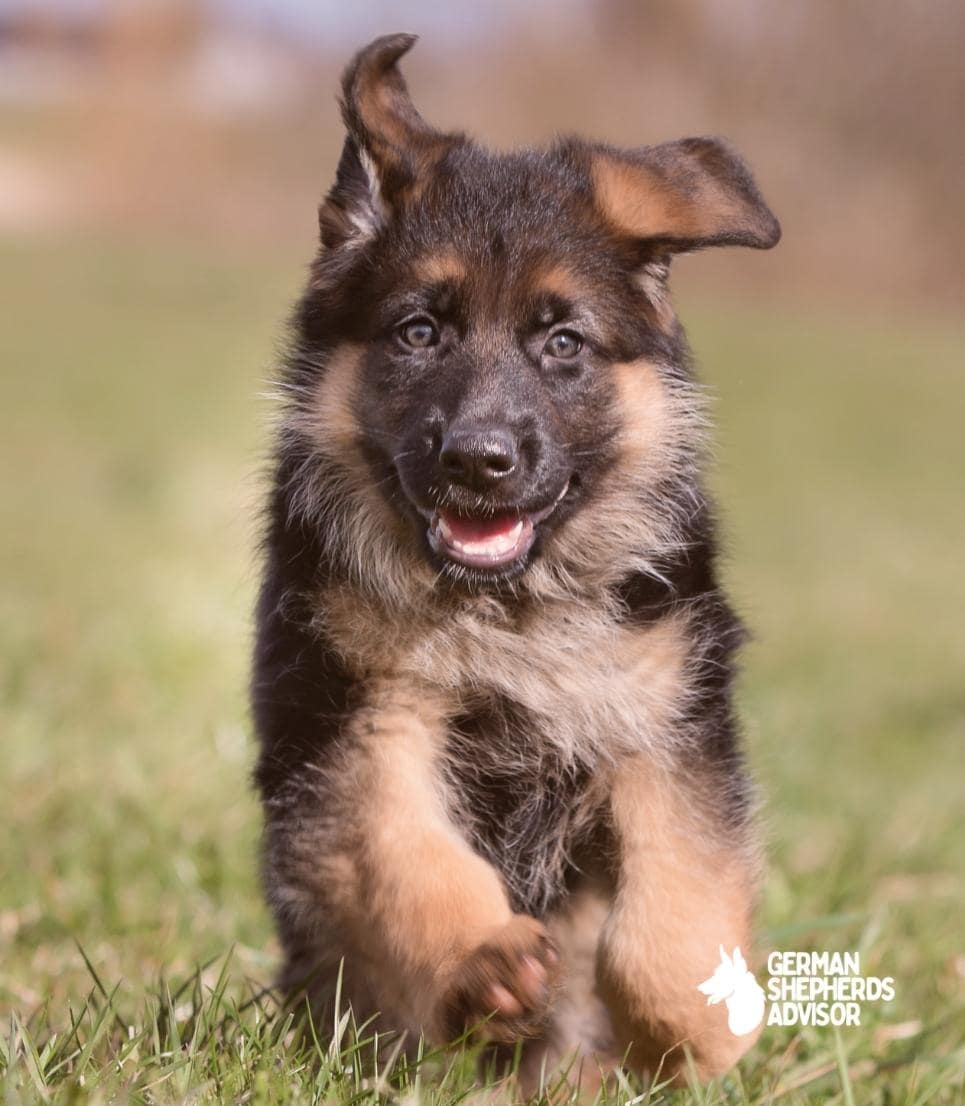

Photo by: Elina Volkova
Origin
Pitbull are generally mistaken as a breed in itself, but such is not the case. An authority like the American Kennel Club is one of the few that does not recognise Pitbull as a pure breed.
They were developed in the 19th century in the United Kingdom as fighting dogs and to be used in the pits to tackle ferocious animals like bulls’ bears and other large animals.
They were trained to bite and hold them still, which would render the beast incapacitated for the entertainment of the watching crowd, mostly containing the lower class of the economy.
Reputation
This gave the Pitbull a notorious reputation and made them popular in a blood sport known as “bull baiting” until the bloody sport was banned in the late 1800s. Sadly, in underdeveloped countries, Pitbull remain favourites among the feudal and other rich rural families for blood sport.
If it is because of their brutish faces or the violent and tragic ancestry they have had. Pitbulls are mainly trained to be brutal and feral and are kept hungry.
The hungrier they are, the bloodier they get, and they mainly win their owners the fight by sheer force of their strength and survival instincts. In more civilized situations, a Pitbull is trained to wound and hold still its prey instead of killing or feeding on it.
Breeds like the American Staffordshire terrier, American Bulldog, and the Staffordshire bull terrier, and American Pit Bull Terrier fall under the term “pit bull,” which is a “type” of dog and NOT a breed. To avoid confusion, a hybrid of some kind of bulldog and a terrier can be put in a category of “bully breed.”
Physical attributes
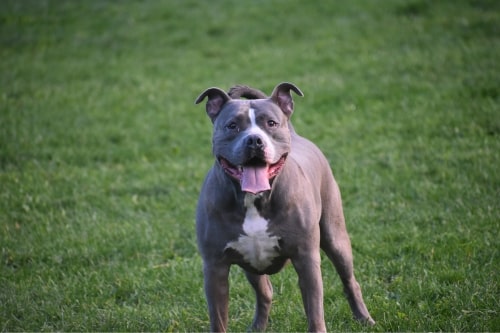
German Shepherds have a tawny and black coat of fur, which can be longer in length or kept medium. Physically, they are taller and longer in comparison, with a wolf-like grace to their bearing.
Their sense of smell outperforms almost any other dog, which puts them on top of the list for police and detection work. In many countries, German Shepherds are preferably used on the borders and airports for sniffing traces of bombs and drugs.
Pitbulls are shorter but have a well-defined and muscular body, bordering on thickset with a white, grey, brown, and black coating of fur. They also come in colours that are a combination of all of these colours and sometimes in stippled and mottled markings.
The difference in physicality is owed to the blending of contrasting kinds of Bulldogs and Terriers. When they open their mouth, Pitbulls look like they are giving you the biggest smile of the era—unlike a Cheshire cat, you know the kind of smile where a face splits from ear to ear.
Appearance
Sometimes, one could use a face like that after having a hard day at work or at life in general. This makes a German Shepherd look more dignified yet demure and “grandfatherly” in comparison, which sort of makes sense when you watch a dog movie and the German Shepherd is voiced over by a baritone, reminiscent of a fatherly or patriarchal figure in your life.
The German Shepherds are 24 to 26 inches tall, whereas Pitbulls stand much shorter at 18 to 21 inches in height. An adult German Shepherd weighs about 30-40 kg (50 to 90 lbs.) and Pitbulls around 15-27 kg (33 to 60 lbs.) depending, of course, on the dogs’ diet and training.
Pitbulls eat less—around 2.5 cups of food a day—because of their smaller build. But German Shepherds are larger dogs and eat around 3 to 4 cups a day.
Grooming
The shedding of German Shepherds is average, and they will shed their underfur two times a year. It is still better practice to brush their coats every alternate day. There is also no need to bathe a German Shepherd until he has been naughty, has rolled in the mud, or has been unusually dirty. Dog owners suggest bathing them twice a year is enough because the more you wash them, the more skin allergies they will have.
Shedding
The shedding of German Shepherds is average, and they will shed their underfur two times a year. Pitbull’s’ fur is shorter in length, but the shedding is severe, which is why it is best that the fur is brushed twice a week, at least or ideally, daily.
This controls the problem pretty much. Experts and dog owners alike suggest investing in a Furminator and high-quality vacuum cleaner, whether you own a German Shepherd or Pitbull.
The reason being that there is going to be a lot of dog hair in the air, on the floor, on your expensive sofas, in your life, and in your food. Imagine yourself labouring the entire day in the kitchen, cooking an excellent meal after sifting through libraries upon libraries of food videos and finally finding out that you have already downloaded it centuries ago just so you avoid all the hassle of finding “the one” recipe.
Food behaviour
This is one level of frustration. You finally cook the food by pouring your heart into it, put the dish in front of your favourite person in this world, and they pull that strand of hair from their mouth!
Now that’s what I call gag-worthy embarrassment and frustration on biblical proportions! Nobody cares if that hair came from your beloved pooch; its hair in food; it’s not delicious and not acceptable, period.
It is also very important that the nails of both the breeds are given regular trimming, especially if they spend a lot of time inside the house. One, it’s not safe even if it is an accident and one of the children or anyone else gets scratched. Secondly, to avoid any hygiene-related issues.
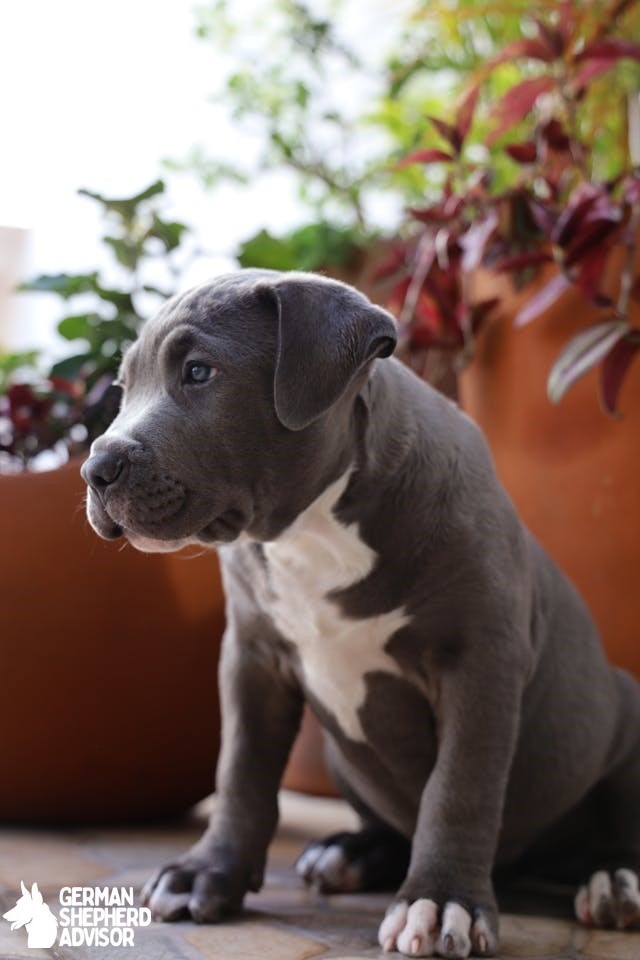
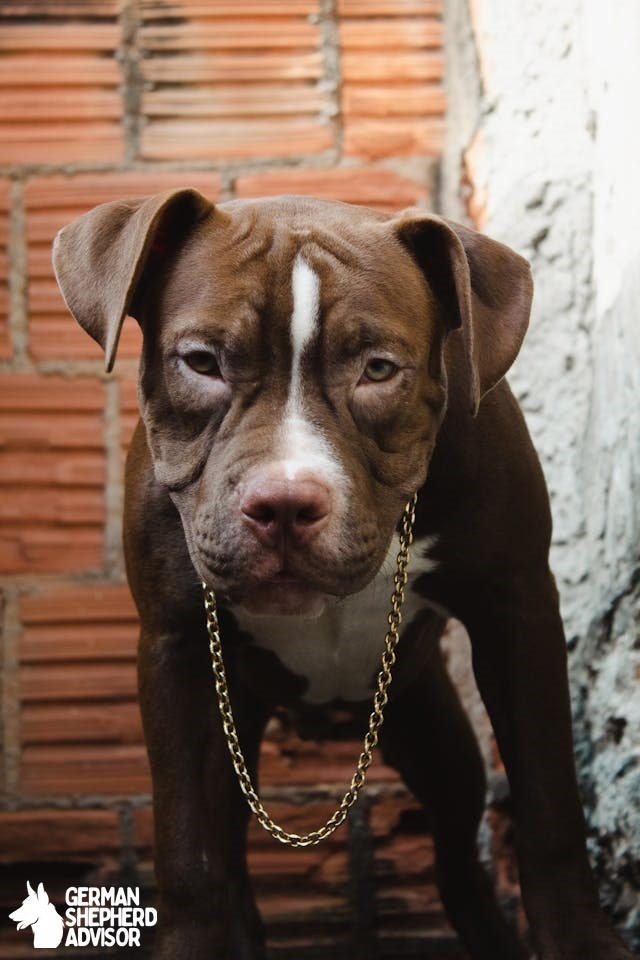
Photo by: Joice Rivas, Photo by: Jonathas Cardoso.
Lifespan
The average life span of a Pitbull is 8 to 16 years, but the German Shepherd lives only up to 9 to 13 years. The German Shepherd and Pitbull both suffer from hip dysplasia.
Individually, the German Shepherds suffer from elbow dysplasia, degenerative or myelopathy, which affects the mobility in their legs and is caused by spinal cord dysfunction.
It also has a weaker digestive system that can be strengthened by a diet rich in fibre. Pitbull are susceptible to cerebellar abiotrophy, which happens because a specific part of their brain is damaged. Consequently, it causes decreased movability and also cognitive functioning.
Also, skin allergies are a common ailment Pitbull face, most commonly grass allergies. Proper medication and superior-grade kibble can fix these problems for your favourite pet.
Which are better fighters? German Shepherd vs Pitbull
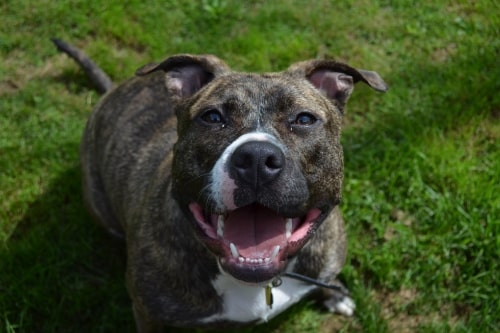
It all comes down to how these two breeds of dogs have been trained. Although the German Shepherds have a height and weight advantage over Pitbull, that does not necessarily mean that the German Shepherd will win anytime they get into a fight with the other.
In case both the German Shepherds and Pitbull have not had any training to fight. German Shepherds can be safely assumed to win a fight against the Pitbull, benefiting from their height and weight. Even so, the German shepherd should be kept at bay and not let into just any fight, as it may not always be an ideal situation.
On the contrary, a Pitbull trained to fight will almost always win against a German shepherd that is not trained to fight, regardless of how much it weighs or however tall it is.
Which dog is best? German Shepherd or Pitbull
The Pitbulls have a bad rep for being a dangerous dog breed and are naturally considered fierce beasts because of their gene formation, but that’s all about it.
In fact, the owners of these dogs are unsure if they really should be guard dogs (as this is how they are psychologically conceptualized).
The reason? In reality, the Pitbulls are friendly with people even who are strangers to them. This is why they are better trained to be compliant with their owner’s command and to not trust strangers.
Neither German Shepherds nor Pitbulls are bad dogs. Both have a loving nature and are very energetic; all you have to do is commit to training them, respective of their personalities, and give them plenty of exercise and good nutrition.
Comparatively, German Shepherds make excellent guard dogs because of their skill to learn many commands in a short period of time.
Because of their natural herding skills, if you run into a flock of sheep, a herd of cows, or any grouping of animals, don’t be alarmed if your German Shepherd tries to herd them!
They are just built that way. German Shepherds and Pitbulls are very friendly and great with kids, once again, if trained accordingly, and can be kept with children and family.
There have been instances where German Shepherds would attack other pets around the house. Such was the case with one of my family members who owned a German Shepherd.
German Shepherd Sweetie
The dog in itself was gorgeous, tall, and well built, with a beautiful black and tan double fur coat. There was no problem at all while we stood there and appreciated the dog; it was friendly and almost docile, but it was until a pet crane walked in the courtyard from another corner of the villa.
The German Shepherd crouched low and started growling, and before we could react. It attacked the poor bird and ripped it apart. Within moments, the crane lay in a pile of flesh and feathers.
The dog did not stop there and was still very aggressive even after it was caged and would attack anyone and anything that walked close by the bars.
By the way, the German Shepherd was called “Sweetie” for some reason. (And we agreed, but that was before it went all savage on the family’s lovely pets.) She was bought from a private pedigree dog dealer who assured us that she is “very well trained.”
It can’t be stressed enough that extreme caution should be exercised while buying your favourite pet because even the best pedigrees can get unpredictable, and that is why getting them properly trained is a big yes.
Unfortunately, the wholesale breeding of German Shepherds has given them health-based issues and volatile temperaments.
Conclusion
German Shepherds and Pitbulls are two of the most popular breeds, and getting them is generally not a problem. People are naturally gravitated towards “purely bred genes” (although even they are cross-breeds), which is why German Shepherds seem like the obvious choice.
This makes them costlier than Pitbulls, which you can easily get from pet/dog shelters. German Shepherds cost roughly between $2000-$4500 for the puppies.
On the other hand, Pitbulls are cheaper, costing $200-$1000 for a puppy. The common source of getting these dogs in the US is the American Kennel Club or any individual who is breeding them privately.
Given the comparison, it is now entirely up to you to own a gorgeous German Shepherd or muscly-sturdy Pitbull. Or if you can, be generous and get both! They are loyal creatures, and these days, what’s not to appreciate about loyalty? Happy Shopping!

